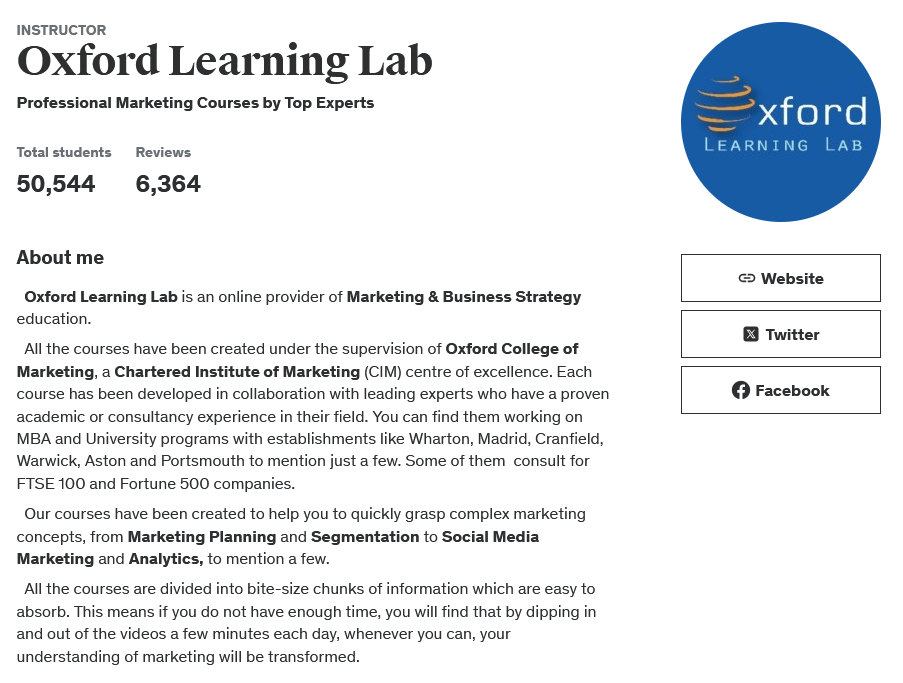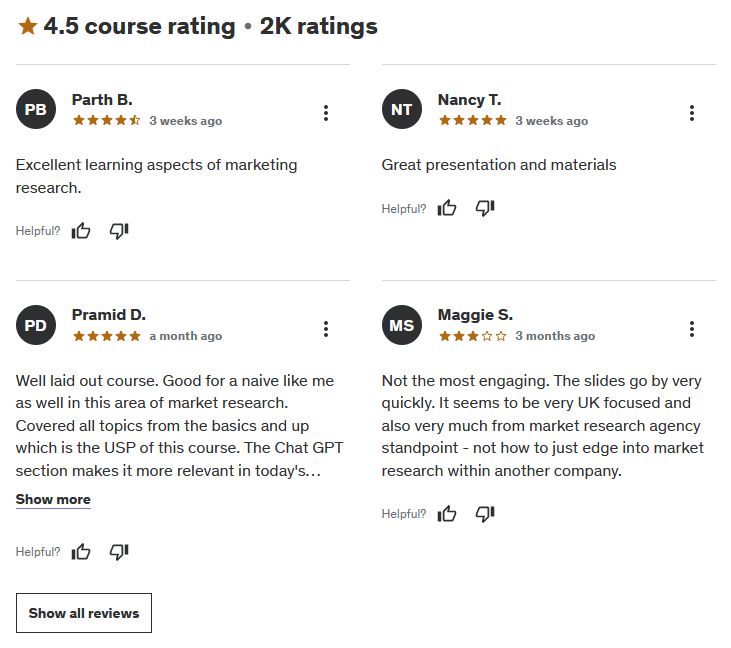Hey there! I recently wrapped up the Udemy course “Marketing Research: support your marketing decisions” and thought, why not share my two cents on it? For anyone looking to get a practical, step-by-step guide to the ins and outs of marketing information and research, this might just be your next stop. So, let’s break it down, shall we?
Right off the bat, this course promises to give you an edge in business through a solid foundation in marketing research. It’s not just about Google-fu; it’s about getting actionable insights to support marketing decisions. The inclusion of Chat GPT for turbocharging marketing research is a nod to the future of digital tools in the field, which honestly piqued my interest from the get-go.
Instructor Reputation: A Deep Dive into Oxford Learning Lab
When it comes to online learning, the instructor or the institution behind the course plays a pivotal role in shaping the learning experience. This is where Oxford Learning Lab stands out, presenting “Marketing Research: support your marketing decisions” with a pedigree that’s hard to overlook. With an instructor rating of 4.3, backed by 6,364 reviews, and a student base of over 50,544 across 25 courses, these numbers speak volumes about their impact and reach in the online education space.

Oxford Learning Lab isn’t just another name in the vast sea of online education providers. It’s an institution that carries the weight of academic rigor and professional expertise, primarily in marketing and business strategy. Their courses are crafted under the guidance of Oxford College of Marketing, a Chartered Institute of Marketing (CIM) centre of excellence. This affiliation isn’t merely symbolic; it’s a testament to the quality and depth of the courses offered.
The instructors and collaborators involved in Oxford Learning Lab’s courses aren’t just academics but seasoned professionals and consultants with real-world experience. These are individuals who’ve not only taught in prestigious MBA and university programs across the globe — including Wharton, Madrid, Cranfield, Warwick, Aston, and Portsmouth — but also consulted for FTSE 100 and Fortune 500 companies. This blend of academic insight and practical experience enriches the course content, ensuring that students gain access to cutting-edge marketing concepts and strategies that are applicable in today’s fast-evolving business landscape.
Moreover, the approach Oxford Learning Lab takes towards education is worth noting. Their courses are designed to be accessible and digestible, catering to the hectic schedules of modern learners. The content is broken down into bite-sized chunks, making it easier for students to absorb complex marketing concepts in short bursts. This pedagogical approach reflects a deep understanding of adult learning principles and the challenges of online education, further enhancing their reputation as a provider of quality marketing education.
Course Structure: An In-depth Look
The structure of “Marketing Research: support your marketing decisions” is meticulously designed to guide learners through the multifaceted world of marketing research with clarity and depth. The course is organized into seven comprehensive sections, complete with over 350 pages of slides that cover a broad spectrum of topics — from designing effective questionnaires and learning research methodologies to leveraging the power of Chat GPT for market research.

This systematic approach to the course content ensures that learners can follow a logical progression through the material, building their knowledge and skills step by step. Starting with an introduction to market research, the course quickly moves into more complex areas, such as data analysis and digital marketing research. This structure is not just about imparting knowledge; it’s designed to equip students with the tools and strategies they need to conduct effective marketing research in a range of contexts.
The digital marketing research segment is particularly noteworthy. In today’s digital age, understanding how customers interact with online platforms, their concerns about privacy, and their behavior on social media is crucial. This course addresses these contemporary issues head-on, providing learners with the insights and analytical tools they need to navigate the digital marketing landscape effectively.
However, it’s not all smooth sailing. Some students have noted that the pace of the course can be brisk, with slides and concepts moving quickly. This feedback underscores the challenge of balancing the depth of content with the need to keep the course engaging and accessible to a broad audience. Additionally, the course’s focus has been described as somewhat UK-centric, which may affect its applicability in other geographic contexts.
Despite these challenges, the structure of the course stands as a testament to Oxford Learning Lab’s commitment to providing comprehensive and practical marketing education. Each section builds upon the last, ensuring that by the end of the course, students have a well-rounded understanding of marketing research that they can apply in real-world scenarios. Whether you’re a seasoned marketing professional looking to update your skills or a newcomer to the field, the course offers valuable insights and strategies to enhance your marketing research capabilities.
Content Quality: A Detailed Examination
The quality of content in the “Marketing Research: support your marketing decisions” course offered by Oxford Learning Lab is a blend of comprehensive knowledge, practical insights, and modern-day applicability. What sets this course apart is its commitment to not only cover the theoretical foundations of market research but also to dive deep into practical applications, particularly the integration of cutting-edge tools like Chat GPT to streamline and enhance marketing research processes.

The course begins with a solid foundation, introducing learners to a ten-step process for conducting market research. This framework is crucial for anyone looking to understand the systematic approach required to gather, analyze, and interpret data to make informed marketing decisions. The inclusion of a section on designing effective questionnaires and learning about different research methodologies provides learners with the tools they need to collect data efficiently and accurately.
One of the most striking aspects of the course content is its emphasis on the role of data in marketing research. In an era where data is often described as the new oil, understanding how to collect, analyze, and draw actionable insights from data is invaluable. This course offers that in spades, ensuring that learners come away with a deep appreciation for the critical role that data plays in the decision-making process.
The introduction of Chat GPT as a tool for speeding up marketing research is perhaps one of the course’s most forward-thinking elements. It acknowledges the growing importance of AI and machine learning in marketing, providing learners with practical guides on leveraging these technologies. The comprehensive slides offer precise prompts for using Chat GPT, covering tasks like collecting and presenting publicly available data, creating buyer personas, and identifying competitors. This not only prepares learners for the future of marketing research but also equips them with the skills to stay ahead of the curve in a competitive landscape.
However, the course is not without its criticisms. Some learners have found the pace at which the slides and information are presented to be too fast, potentially overwhelming those new to the subject. Others have noted a geographical bias towards the UK market and a perspective heavily tilted towards market research agencies, which may limit the course’s relevance for a global audience or for those looking to apply the knowledge in different contexts.
Overall Course Rating: 7.5/10
Taking everything into account, including the depth and breadth of the content, the practical application of modern technologies like Chat GPT, and the feedback from learners, I would rate “Marketing Research: support your marketing decisions” a solid 7.5 out of 10.

The course’s strengths are undeniable. It offers a comprehensive guide to marketing research, enriched with practical examples and modern tools. The expertise of the Oxford Learning Lab and its instructors shines through, providing learners with a level of insight and understanding that is both rare and valuable. The focus on data and the application of AI in marketing research are particularly commendable, reflecting a commitment to not just teach marketing research but to advance its practice.
However, the course does not reach perfection. The criticisms regarding the pace of content presentation and the geographical and agency-centric focus point to areas where improvements could enhance the learning experience and make the course more accessible and relevant to a wider audience. Additionally, more interactive elements or case studies could help in mitigating the pace issue by allowing learners to engage with the material more deeply and at their own pace.
In conclusion, this course stands out as a valuable resource for those looking to deepen their understanding of marketing research, with particular emphasis on the integration of AI tools like Chat GPT. While there are areas for improvement, the course’s strengths in content quality and practical applicability make it a worthwhile investment for marketing professionals, business owners, and students aiming to sharpen their marketing research skills in the digital age.



